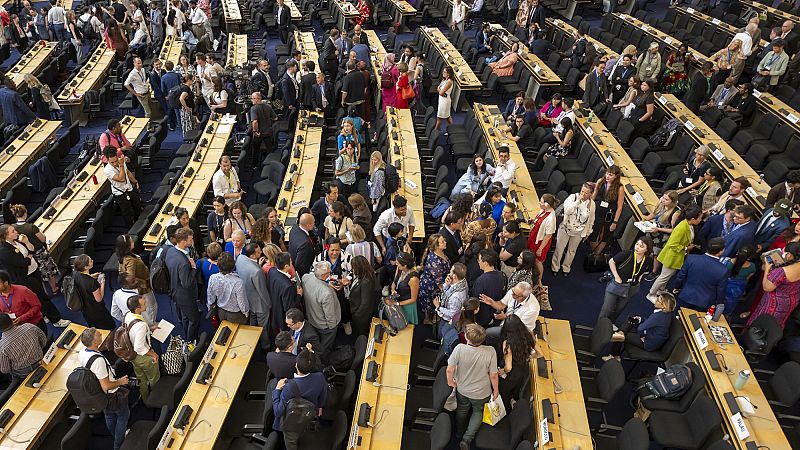Countries deadlocked on plastic production and chemicals as talks near end

Negotiations on a global treaty to end plastic pollution will draw to a close Friday, as nations remain deadlocked over whether to tackle the exponential growth of plastic production.
A new draft of the treaty was expected Thursday, the last scheduled day of negotiations, and a meeting for all of the delegates was scheduled. It was repeatedly postponed until just before midnight. Luis Vayas Valdivieso, the chair of the negotiating committee, called delegates to the assembly hall, but said consultations on the revised draft were still ongoing.
He adjourned in less than a minute and quickly left the stage. Some in the audience gasped. They will reconvene Friday.
Andreas Bjelland Eriksen, Norway’s minister for climate and the environment, said prolonging the meeting is much better than ending it Thursday. Norway and many other delegations have said the current treaty text is unacceptable.
“It means that the chair still believes that it’s possible to drive this process forward. That’s great,” he said.
The draft of the treaty released Wednesday wouldn’t limit plastic production or address chemicals used in plastic products.
Instead, it’s centered on proposals where there’s broad agreement — such as reducing the number of problematic plastic products that often enter the environment and are difficult to recycle, promoting the redesign of plastic products so they can be recycled and reused, and improving waste management.
It asks nations to make commitments to ending plastic pollution, rather than imposing global, legally-binding rules.
French President Emmanuel Macron said the “lack of ambition” in the draft treaty was unacceptable, and that agreeing to a global treaty against plastic pollution “is our opportunity to make a difference.”
“Every day, our health is more threatened. What are we waiting for to take action?” he wrote on LinkedIn. “I call on all states present in Geneva to adopt a text that meets the environmental and health emergency. For our health. For our environment. For our children.”
The talks involve representatives from 184 countries and more than 600 organizations.
About 100 countries want to limit production
Eriksen said Norway’s representatives won’t leave Geneva with “just any treaty.” Norway is helping to lead a coalition of countries called the High Ambition Coalition that want a comprehensive approach to ending plastic pollution, including reducing production.
“We are going to be flexible, but at the same time ambitious in our positions, and work with every single hour that we have left to bring this to a conclusion, a positive conclusion, because the world needs a plastics treaty now.”
Eriksen said he’ll stay “cautiously optimistic” until the bitter end.
Every year, the world makes more than 400 million tons of new plastic, and that could grow by about 70% by 2040 without policy changes. About 100 countries want to limit production as well as tackle cleanup and recycling. Many have said it’s essential to address toxic chemicals.
Powerful oil and gas-producing nations and the plastics industry oppose production limits. They want a treaty focused on better waste management and reuse. They have raised different concerns with the draft text, saying it doesn’t have the scope they want to set the parameters of the treaty or precise definitions.
Proposals on plastic products
Luay Almukhtar, head of Iraq’s delegation, said Iraq would not support a treaty that reduces the production of polymers used to make plastics because it’s not in their interest and it could negatively impact society and economies.
But he said Iraq supports restricting certain chemical additives for some applications and reducing some single-use and short-lived plastic products. Limiting those products, in turn, would reduce plastic production, he added. He hopes to leave Geneva with a treaty.
“Plastic pollution is a big environmental issue and we have to work together to defeat it. That’s why we are here,” he said. “We try to be a bridge, in the middle, on this issue and we are also practical. It’s a balanced approach between environment and economy.”
Today

